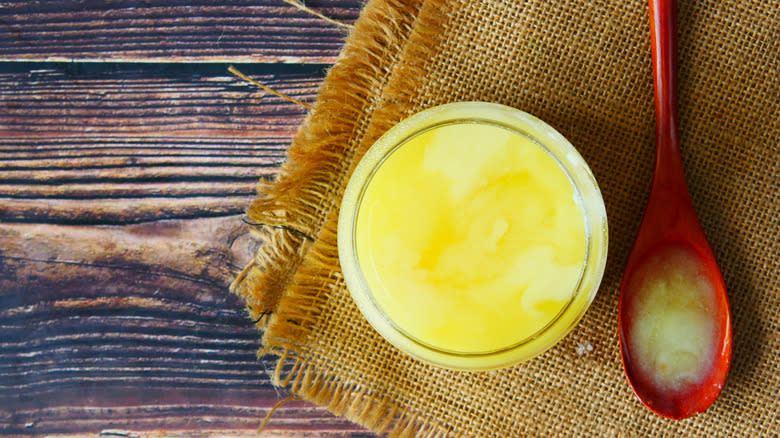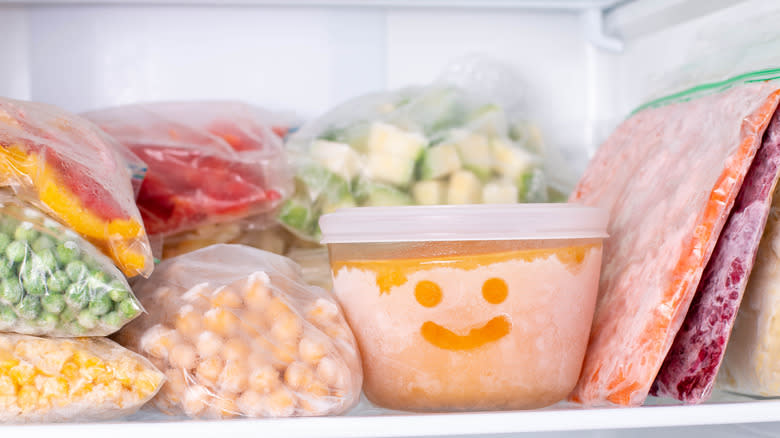The Proper Way To Store Ghee To Keep It Fresh For Longer

Ghee has been a staple food for thousands of years, and according to the Hindu stories that developed around it, it was a gift from the Vedic creator god Prajapati. It's long been used in religious ceremonies as well as in everyday cooking, and part of the enduring popularity of ghee can be attributed to the fact that the process of making it also adds to the shelf life. Still, it is necessary to properly store ghee to keep it fresh, and there are a few steps that should be taken.
Those steps might be made slightly more complicated by the regularity you'll find yourself using this wonderfully versatile ingredient. Ghee can be added to your oatmeal in the morning, it can be used to make some amazing chicken cutlets for dinner, and when evening rolls around? Ghee is the ideal ingredient to add to popcorn. You may be opening that jar a lot, and that's why it's important to consider storing it in two separate containers.
Exposure to moisture is one of the things that can make ghee spoil quickly, and when you repeatedly open and close a jar, there's the risk of moisture getting in. Fortunately, the solution is easy: Keep some in a container for regular use, while storing the bulk of it in the cabinet, fridge, or freezer. Refill as needed, and with the help of just a few more easy tips, your ghee will stay fresh, delicious, and a go-to ingredient in your kitchen.
Read more: 7 Butter Brands You Should Buy, And 7 You Shouldn't
Ghee Stays Freshest In Cool, Dark Conditions

Let's start with a brand-new, unopened jar of ghee. There's no need to put that in the fridge, and it'll be fine in a dark cabinet for at least around nine months. Storage gets a little more complicated when you open it: Heat, humidity, moisture, and sunlight are the biggest problems, so it's key to consider your own environment and what's going to work best for you. Although there are many sources that suggest it's not necessary to keep ghee in the refrigerator, fridging it is exactly what you might want to do if you live in a year-round hot climate, or if you're going through some hot summer months.
In the fridge, ghee will keep for around a year before you have to think about it getting funky. The footnote to this is that colder ghee will harden and be more difficult to use, but that's where our guideline about multiple containers comes in: Keep a small amount in the cabinet and it'll be ready to use, while the rest stays fresh in the fridge.
You'll also want to invest in an airtight container to help keep out as much moisture as you can. Glass containers can be fine — as long as they're in a dark place — but investing in a stainless steel container could be beneficial as well. It's worth noting, too, that moisture can also be introduced when you're scooping out ghee or refilling your smaller container, so be sure to always use clean, dry utensils.
Buying Ghee In Bulk? Keep It In The Freezer

When kept at a cool room temperature, ghee will usually stay fresh for around three months — and it's entirely possible that you're going to be using up a batch in that time, so keeping it fresh for longer might not be necessary. However, if you're buying a large amount and want to keep it around for even longer, there are a few things you can do.
For starters, keeping it in the fridge means it'll stay at peak freshness for up to a year. If you think your supply might last longer than that, you can definitely transfer it to airtight containers and store it in the fridge — and yes, we said containers. Depending on how much you have, you may want to divide your ghee into smaller portions and freeze them in individual, freezer-safe containers to make thawing them easier — particularly considering that ghee can easily become freezer-burned if it's refrozen.
With those guidelines in mind, you should also know that ghee does go bad. If it smells sour, starts to look unevenly discolored, or develops mold, it's time to throw it away. Finally, you should consider getting rid of any unused ghee that's still around after a few years. Even if stored properly, it'll start to lose freshness and quality when it reaches that age, and it's always better to be safe than sorry.
Read the original article on The Daily Meal.


